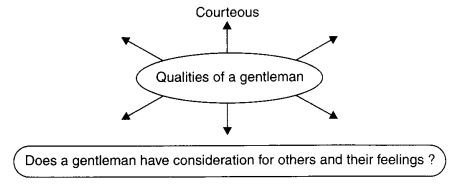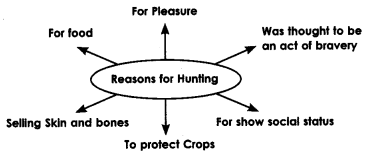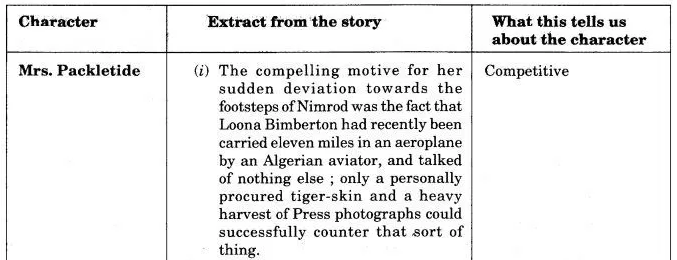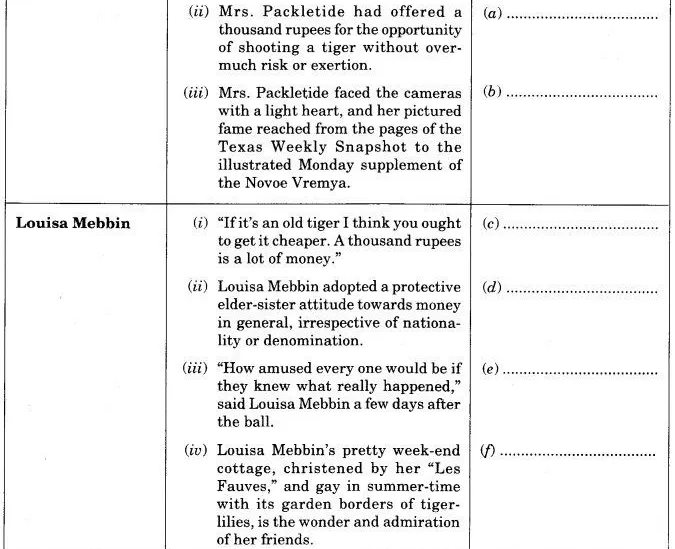NCERT Solutions for Class 10 English Literature Chapter 2 Mrs. Packletide’s Tiger
NCERT Solutions for Class 10 English Literature Reader Chapter 2 Mrs. Packletide’s Tiger
TexBook Questions
Question 1.
Why do people hunt? Complete the web chart giving various reasons for the same :

Answer:

Question 2.
Read these lines and guess the answers to the questions given below :
It was Mrs. Packletide’s pleasure and intention that she should shoot a tiger … The compelling motive … was the fact that Loona Bimberton had recently … personally procured tiger-skin and a heavy harvest of Press photographs could successfully counter that sort of thing.
(a) Why did Mrs. Packletide want to kill a tiger?
Answer:
Mrs. Packletide wanted to kill a tiger for pleasure and to compete with her friend Loona Bimberton who had procured a tiger-skin and gained great popularity.
(b) What does it tell you about her?
Answer:
She wanted to shoot a tiger as she was jealous of her friend and wanted to gain popularity.
(c) What is the tone of the storywriter?
Answer:
The tone of the story writer is humorous.
(d) Do you think she was successful in her mission?
Answer:
Yes she was successful in her mission.
(e) What do you think the story is all about?
Answer:
The story is about hunting a tiger for pleasure and popularity.
Question 3.
Answer the following questions in your own words :
(a) Why did Mrs. Packletide wish to kill a tiger?
Answer:
Mrs. Packletide wished to kill a tiger because her friend had procured a tiger-skin so she was jealous and wanted popularity for herself.
(b) What made her decide to give a party in Loona Bimberton’s honour? What did she intend to give Loona on her birthday?
Answer:
She decided to give a party in Loona Bimberton’s honour for she wanted to show her a tiger skin rug and feel proud. She intended to give a tiger-claw brooch to Loona on her birthday.
(c) How was the tiger shooting arranged ? What kind of a tiger was chosen for the purpose?
Answer:
Mrs. Packletide offered a thousand rupees to the villagers to help to shoot a tiger. A platform was constructed in a comfortable and convenient place in a tree where Mrs. Packletide sat with her rifle and her paid companion Miss Mebbin. An old and feeble tiger was chosen for the purpose.
(d) In what way did the villagers help Mrs. Packletide shoot the tiger?
Answer:
The villagers arranged for an old tiger, children were told to head the tiger back in the local jungle, cheaper kind of goats were-left to keep him satisfied. Mothers were made to keep their babies quiet so as not to disturb the animal.
(e) Who was Miss Mebbin ? Was she really devoted to Mrs. Packletide ? How did she behave during the tiger shooting?
Answer:
Miss Mebbin was Mrs. Packletide’s paid companion. No she was not really devoted to Mrs. Packletide. She made fun of the shooting and said that it would be useless to pay for the tiger if he didn’t touch the goat.
(f) Mrs. Packletide was a good shot. Discuss.
Answer:
Mrs. Packletide shot at the tiger. The tawny beast sprang to one side and rolled over dead. Miss Mebbin drew attention that the goat had been killed by the bullet, while there was no trace of a bullet wound on the tiger’s body. The wrong animal had been killed and the tiger died due to heart failure caused by the sudden sound of the rifle.
(g) What comment did Miss Mebbin make after Mrs. Packletide had fired the shot ? Why did Miss Mebbin make this comment ? How did Mrs. Packletide react to this comment?
Answer:
Miss Mebbin said “How amused everyone would be if they knew what really happened”. She made this comment to make fun of Mrs. Packletides shooting. Mrs. Packletide said that no one will believe it. As soon as the tiger died, the villagers came shouting excitedly for they were happy to get their money.
(h) How did the villagers react to the tiger’s death?
Answer:
The villagers shouted happily. How the tiger was killed did not matter to them. They were only excited to get ? 1000.
(i) Do you think Mrs. Packletide was able to achieve her heart’s desire ? Give reasons for your answer.
Answer:
Yes, Mrs. Packletide was able to achieve her hearts desire. She got popularity. Her pictured fame reached from the pages of Texas Weekly Snapshot to the illustrated Monday supplement of the Novoe Vremya.
(j) How did Miss Mebbin manage to get her week-end cottage 1 Why did she plant so many tiger lilies in her garden?
Answer:
Miss Mebbin tried to blackmail Mrs. Packletide by not letting out the secret if she would get a week-end cottage instead. She planted many tiger-lilies in her garden to remind Mrs. Packletide about the big game shooting.
(k) “The incidental expenses are so heavy”, she confides to inquiring friends. Who is the speaker ? What is she referring to here?
Answer:
The speaker is Mrs. Packletide. She is referring to the game of hunting.
Question 4.
Discuss the following questions in detail and write the answers in your notebooks :
(a) Do you think the tiger shooting organized by the villagers was a serious affair ? Give f reasons for your answer.
Answer:
The tiger shooting organised by the villagers was a serious affair because Mrs. Packletide had offered a thousand rupees for the opportunity of shooting a tiger without taking much risk. A neighbouring village was chosen for the game killing. The idea of earning a thousand rupees had egged on the villagers. They had posted their children at the borders of the local jungle to head the tiger back to the village so that it may not go to some fresh hunting grounds.
Mrs. Packletide was compelled to do this as the idea of her friend Loona Bimberton boasting of her personally procuring a tiger-skin and popularity of the press photographs could not be digested. Mrs. Packletides movements and motives were largely governed by the dislike of ‘ Loona Bimberton.
Cheaper kind of goats were left about in a great number to keep the tiger satisfied. All precautions were taken so as not to drive the tiger away. A platform was constructed in a conveniently placed tree. Mis. Packletide even paid her companion Miss Mebbin to accompany her to the shoot. For the villagers it seemed to be a serious affair for as soon as the rifle flashed and the beast rolled over dead, a crowd of excited natives came to the place shouting happily and carried the news to the village. They were anxious for their thousand rupees. Mrs. Packletide faced the cameras with a light and a happy heart.
(b) Do you think the writer is trying to make fun of the main characters in the story i.e. Mrs. Packletide, Miss Mebbin and Loona Bimberton ? Pick out instances from the story that point to this fact.
Answer:
This story is full of humour. The writer has tried to make fun of the society through the characters of the three women in the story. The competitive and jealous nature of Mrs. Packletide motivated her to game killing because her friend Loona Bimberton had procured a tiger-skin and procured press photographs. Mrs. Packletide had even offered a thousand rupees for this game without taking any risk and faced the cameras happily showing that she had killed that beast but the fact was the tiger had died of heart failure due to the loud sound of the rifle. ‘
Miss Mebbin was hired by Mrs. Packletide to accompany her to the game, she had a protective attitude towards money and was greedy. She even made fun of Mrs. Packletide by saying “If it is an old tiger you ought to get it cheaper”. Louisa Mebbin had blackmailed Mrs. Packletide into buying her a pretty cottage for not letting out the secret that the wrong animal had been killed. The writer makes fun of Mebbin that she had named her cottage as “Les Fauves”.
Loona Bimberton has been presented as a shrewd person with a spiteful nature. She had boasted about the tiger-skin but had refused to look at the illustrated paper for weeks for it contained the pictures of Mrs. Packletide with her hunted tiger. Her emotions seemed to be repressed as she wrote the letter of thanks for the gift of a tiger claw-brooch. The writer has tried to make fun of three women who tried in their own way to get popularity.
(c) A person who is vain is full of self importance and can only think of himself / herself and can go to great lengths to prove his / her superiority. Do you think Mrs. Packletide is vain ? Give reasons in support of your answer.
Answer:
Mrs. Packletide is a vain. It was not because of her pleasure that she should shoot a tiger nor the lust came upon her. But her friend Loona Bimberton boasted about getting a tiger skin and facing the cameras had made Mrs. Packletide envious of her friend. The urge to face the camera herself forced her to offer a thousand rupees for the chance of shooting a tiger without much effort. She was competitive in nature which made her arrange for the shoot. She had already arranged a lunch in honour of Loona Bimberton and even planned to give her a tiger claw-brooch. She wanted to show her superiority by herself shooting a tiger so that she should also face the camera. She tried to go to any lengths to prove this. She arranged for a paid companion to accompany her for the shooting. All possible efforts were made to make it a success. Even though the wrong animal was killed she faced the camera boldly with the dead tiger to prove her courage.
(d) Sometimes writers highlight certain negative aspects in society or human beings by making fun of it. This is called satire. In your groups discuss whether you would classify this story as a satire. Give reasons to support your answer.
Answer:
The writer has used satire in the story. He has made fun of the characters in the story to bring out the satire. Mrs. Packletide is a shrewd and competitive person, she becomes jealous of her friend when she comes to know that Loona Bimberton has got a tiger-skin and faced the press and procured photographs. She too out of her pride arranges to shoot a tiger. She goes to the length of offering money to the villagers. An old tiger is lured by cheaper goats.
The writer uses satire to make fun of the society that would do anything in order to become famous as portrayed by Mrs. Packletide. The other side of the greedy society is reflected by Miss Mebbin. She is a greedy lady who blackmails Mrs. Packletide to buy her a cottage so that she would not give away the secret of the wrong animal being killed. The villagers represent another group of the society who are also greedy for money. For them money mattered more than the animal that was shot, whether it was the goat or a tiger.
(e) How does the writer create humour in this story ?
Answer:
The story is full of humour. Mrs. Packletide arranges for the shooting. The funniest part is that a weak tiger is arranged and cheaper goats are left to lure him. Mrs. Packletide is not a good shooter but a platform is constructed in a tree and she sits there with a rifle a thumb- nail pack of patience cards. The funniest part is as soon as the tiger caught sight of the goat it lay flat on the earth, seemingly less from a desire to take advantage of and attack its prey.
The rifle is shot with a loud bang and the great beast springs to one side and then rolls over dead. Miss Mebbin makes fun of Mrs. Packletide by bringing out the fact that the wrong animal had been killed. The bullet had hit the goat but the tiger had a heart failure because of the loud noise of the rifle. The villagers shouted happily for they were only anxious for their thousand rupees and gladly connived at the fiction that she had shot the tiger. Mrs. Packletide faced the cameras happily and her pictured feme reached the pages of Texas Weekly Snapshot.
Question 5.
Choose extracts from the story that illustrate the character of the people listed in the table given below. There are some words given to help you. You may add words of your own. One has been done as an example :
vain jealous competitive shrewd manipulative stingy materialistic spiteful



Answer:
Mrs. Packletide
(i) Competitive
(ii) Shrewd
(iii) Proud
Louisa Mebbin
(i) Materialistic
(ii) Greedy
(iii) Humorous
(iv) Satirical
Loona Bimberton
(i) Spiteful
(ii) Jealous
Question 6.
There are many amusing lines in the story. Here are a few of them. Rewrite each one in ordinary prose so that the meaning is retained. One has been done for you as an example:
(a) It was Mrs. Packletide’s pleasure and intention that she should shoot a tiger.
Mrs. Packletide wanted to shoot a tiger
(b) Mrs. Packletide had already arranged in her mind the lunch she would give at her house in Curzon Street, ostensibly in Loona Bimberton’s honour, with a tiger-skin rug occupying most of the foreground and all of the conversation.
(c) Mothers carrying their babies home through the jungle after the day’s work in the fields hushed their singing lest they might curtail the restful sleep of the venerable herd-robber.
(d) Louisa Mebbin adopted a protective elder-sister attitude towards money in general, irrespective of nationality or denomination.
(e) Evidently the wrong animal had been hit, and the beast of prey had succumbed to heart-failure, caused by the sudden report of the rifle, accelerated by senile decay.
(f) As for Loona Bimberton, she refused to look at an illustrated paper for weeks, and her letter of thanks for the gift of a tiger-claw brooch was a model of repressed emotions.
Answer:
(b) Mrs. Packletide had planned to give a lunch at her house in Curzon Street in honour of Loona Bimberton showing everyone the tigers skin rug hat she had.
(c) In order not to disturb the tiger, mothers tried to keep their babies quiet.
(d) Louisa Mebbin cared a lot for money irrespective of anything.
(e) Mrs. Packletide hit the wrong animal and the tiger died of heart failure because of the loud noise of the rifle.
(f) Loona Bimberton was jealous to see Mrs. Packletide with the dead tiger. She unwillingly wrote a letter of thanks to her for the gift of a tiger-claw brooch.
Question 7.
An oxymoron is a figure of speech that combines normally-contradictory terms. The most common form of oxymoron involves an adjective-noun combination of two words like—failed success.
Writers often use an oxymoron to call attention to an apparent contradiction. For example, Wilfred Owen’s poem The Send-off refers to soldiers leaving for the front line, who “lined the train with faces grimly gay.” The oxymoron ‘grimly gay’ highlights the contradiction between how the soldiers feel and how they act: though they put on a brave face and act cheerful, they feel grim. Some examples of oxymorons are—dark sunshine, cold sun, living dead, dark light, almost exactly etc.
The story ‘Mrs. Packletide’s Tiger’ has a number of oxymorons. Can you identify them and write them down in your notebooks?
Answer:
Oxymorons : morbid dread, sympathetic hands, laud report, glad news, pardonably annoyed, disagreeably pleasant, gladly connived.
Writing Task
Question 8.
(a) Years later Mrs. Packletide writes her autobiography. As Mrs. Packletide, write about the tiger episode with the help of the clues given below.

Answer:
My friend Loona procured a tiger skin and so she got all the honour at the press. I was jealous of her and thought of getting a tiger skin myself. I asked the villagers to make all the arrangements for killing a tiger and agreed to pay them one thousand rupees. I forced my friend Mebbin to accompany me for the hunt. We both sat on a platform placed in a tree. I pointed my gun at the goat tied under the opposite tree. As soon as the tiger approached clumsily, I shot at him. It sprang on one side and fell down dead. The villagers shouted with joy. But Mebbin told me that instead of eating the goat, the tiger had died due to the loud sound of the bullet. I had missed the aim, Mebbin was cunning to blackmail me in buying her a summer cottage that she so much desired for not letting out the secret of the hunt. I was able to get the tiger skin but had to pay a huge price to outdo a rival.
(b) In groups of four construct the dialogues and enact the following situations from the story :
- Mrs. Packletide and the headman of the village/other villagers discussing the details of the tiger shooting.
- Miss Mebbin blackmailing Mrs. Packletide into gifting her a cottage.
- Loona Bimberton and a lady-friend discussing Mrs. Packletide’s hunting success.
Answer:
- Mrs. Packletide : “I wish to shoot a tiger and I am sure this area is the most suitable place.” The village headman: “We can help you in the hunting, but it is not an easy job.” Mrs. Packletide “I will pay for the tiger”.
A villager: “we agree, but you will have to pay us one thousand rupees. We will surely arrange for a tiger and make all other arrangements.”
Mrs. Packletide: “I am ready to pay the amount.” - Miss Mebbin: “If you want me not to let out the secret, that the wrong animal was killed, then you have to buy me a summer cottage, which I so much desire.”
Mrs. Packletide: “I’ am sure you would not let me down. I will pay for the cottage.” - Loona Bimberton : “I cannot believe that Mrs. Packletide killed a tiger.” I don’t want to see the weekly.
A lady friend: “But I’m sure she did shoot.”
Listening Task
Question 9.
Listen to the passage on lion hunting and answer the questions given below :
1. The Maasai tribe in Africa hunt lions because
(i) they live near the forests of Africa
(ii) they view it as a sign of bravery and personal achievement
(iii) they are a hunting tribe
(iv)they adorn their bodies with body parts of the lion.
Answer:
(ii) they view it as a sign of bravery and personal achievement
2. Solo hunting has been banned because
(i) it is dangerous
(ii) of the declining lion population
(iii) too many hunters have been killed
(iv) it creates pride in the minds of the successful hunters.
Answer:
(ii) of the declining lion population
3. The hunting of lionesses is discouraged because
(i) they bear the cubs
(ii) they run much faster
(iii) they are more fierce
(iv) they cannot be spotted easily.
Answer:
(i) they bear the cubs
4. The Maasai warriors chase a lion with rattle bells to
(i) awaken it
(ii) make it run faster
(iii) make it angry
(iv) frighten it.
Answer:
(iv) frighten it.
5. The Maasai use three parts of the lion. They are
(i) the mane, tail and claws
(ii) the mane, nails and claws
(iii) the mane, tail and nails
(iv) the whiskers, tail and claws.
Answer:
(i) the mane, tail and claws
6. The tail is given to
(i) the strongest warrior
(ii) the fastest warrior
(iii) the youngest warrior
(iv) the bravest warrior.
Answer:
(i) the strongest warrior
